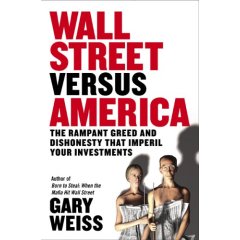Originally
published on Monday, May 15, 2006 in The Miami Herald
Shocking horror stories from Wall Street.
The foxes are guarding your henhouse and have invited their friends -- the wolves, the pigs and the weasels -- to their party.
BY RICHARD PACHTER
rapATwordsonwords.com
Wall Street Versus America: The Rampant Greed and Dishonesty That Imperil Your Investments. Gary Weiss. Penguin. 320 pages.

If you've ever tried to find a rational explanation for how the stock market functions, forget it. There isn't one. As young students, we may have been taught something about shares and ownership, profits and dividends, and other means through which the value of a company is measured by the price of its stock. But if you've got a solid, 100-year-old plus, multimillion-dollar company that's generating a consistent 20 percent profit, with shares valued far less than those of a relatively new, supposedly multibillion-dollar firm that's yet to make a dime in profit, you tell me what's so rational about the stock exchange.
For example, it's not enough to say that you are ''family-owned'' or ''the oldest weasel broker in Ojus,'' because, by themselves, they are not competitive advantages. But if you say, ''our family invented the Johnson Rod in 1954 and our constant innovation guarantees that you'll get the No. 1 selling rod in the country for 20 percent less than anywhere else,'' that's a competitive advantage. So is this one: ``We were here when the first weasels arrived in Ojus and can give you same-day delivery on the most colorful and talented weasels in the world.''
Anyone who has studied the market for more than 10 minutes knows that it's ruled by emotion, greed, expediency and, often times, almost anything but logic and rationality. The institutionalization of these qualities, as manifested in the hierarchy of brokerage firms and so-called government regulatory organizations, is the subject of this book.
Author Gary Weiss' previous work, the stunning Born To Steal, told the tale of a gang of petty thugs and Mafiosi who ran phony stock scams on unsuspecting investors. He also reported about Wall Street for many years as a writer for Business Week magazine.
This new book is a take-no-prisoners, scorched-earth look at how things work, according to Weiss.
I'm confident that some brokers and others working in the market can offer evidence to refute this claim by Weiss: ``The real Mutual Fund Scandal is not trading, late or otherwise, but happiness. Fund managers are happy people with high self-esteem who draw fat salaries and bonuses for jobs that could literally be done by nobody -- an unmanaged index fund that mechanically invests in the S&P 500 or some other index. Fund companies charge you for inflated feed and expenses, trade too much, pay through the nose in commissions and overpay their pals in the brokerage industry in return for office space, research and other perks, with you footing the bill.
``If you do a sloppy job painting someone's house or designing a company's website, you'll be tossed out on your ass. But if you are hired by a fund-management company to manage money, you are as snug as a nephew on the CEO's payroll.''
Such is Weiss' prose. His colorful characterizations are usually accompanied by very specific examples to reinforce and amplify his points. The hilarious and merciless observations on such luminaries as former SEC Chairman Arthur Levitt, former New York Stock Exchange head Richard Grasso, supposedly crusading New York State Attorney General Eliot Spitzer and others are worth the price of admission.
But Weiss' knowingly jaundiced macro view of the investment industry is like a horror movie: shocking and fantastic, with generous helpings of humor to offset the atrocities.
Weiss also offers a number of remedies, tactics and strategies that individuals can implement to protect themselves. He sees little in the way of assistance coming from the mostly self-regulated industry, which defends itself by stacking the deck with enforced arbitration instead of allowing open litigation.
While it may be difficult to completely assess the accuracy and efficacy of Weiss' information, if even one percent of what he writes is true, securities trading appears more akin to gambling in a crooked casino than honest investing in a free marketplace.
Like business books? Join the club.
|

